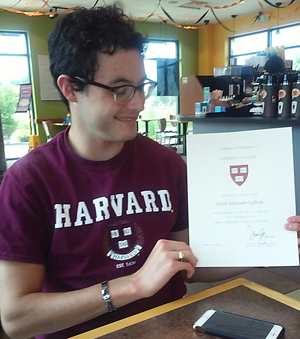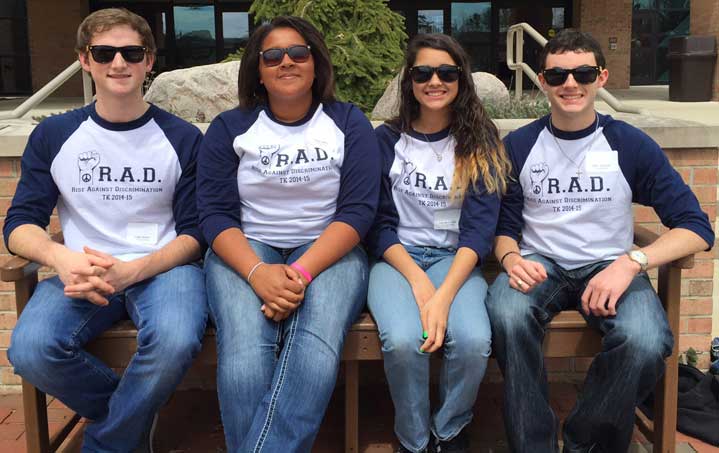A recent district grad who’s lived his life with serious health problems is on his way to Harvard, an accomplishment that surprised even him.
Justin Sydloski applied to four colleges and was accepted by the University of Michigan to study pre-med, then decided to apply to Harvard and Yale on a whim. “Why not?” he said. “You never know.”
That positive attitude has been with him throughout his education despite his medical issues. Much of that is thanks to his parents, who raised him “to be who he is,” said his mother, Ellen Mazique-Sydloski.

Justin suffers from osteogenesis imperfecta (OI), a genetic disorder that causes bones to break easily, and he has Tourette’s syndrome, which causes repetitive body jerks, eye blinking and uncontrollable vocal sounds.
“His achievements (are) nothing short of miraculous,” said high school science teacher Pat Pullen.
Getting into Harvard required two essays and and an interview with a Harvard alumnus (which took place at the Biggby Coffee in Caledonia). After which, Justin was wait-listed. Then, one day after Quidditch practice, he was taking a shower at home and the phone rang. His mom answered. Trying to be calm, she told Justin to get out of the shower because he had a phone call. “Now, Justin, now!” she remembers telling him when she thought he wasn’t moving fast enough.
Wrapped in a bath towel, he took the phone and was told he’d gotten into Harvard. “I was in shock,” he said. “Mom got a big wet hug afterward.”
The Ivy League school admitted only six percent of about 30,000 applicants this year, according to U.S. News and World Report.
It Never Stopped Him
Despite his medical problems and the possibility of broken bones, Justin’s mother didn’t keep him from participating in sports when he was younger, he said. He played soccer in kindergarten, basketball in his elementary years, learned karate and was on the high school tennis team. “You can’t live in fear,” his mom said, recalling that on his first day of kindergarten, Justin had a broken leg in a pink cast. “You can’t live in a bubble. When we break something, we heal. We raised him, especially because of his OI and Tourette’s, just to be who he is.”
Justin has a mild form of OI. His mom has it, too, and suffers chronic pain. She also has hearing loss, which develops in adulthood. Both of them have a bluish grey tint to the whites of their eyes.
In Justin’s freshman year of high school, his mom and dad, Darryl, realized the OI was progressing very quickly and decided to have him undergo a spinal fusion. “I didn’t want him to live with what I have to live with,” said his mother. He’s also had surgeries on both of his legs twice to correct them from pointing outward, three elbow surgeries and has had a spinal rod inserted, removed and replaced. Today, there are two rods and 16 screws in his spinal area.
In his sophomore year, Justin says, he came out of his shell, though it’s hard to believe he was ever in one. He started joining club after club and taking part in numerous activities — so many he had a hard time remembering them all when asked. They included student council, National Honor Society, Rise Against Discrimination and Teens Against Tobacco Use. He especially liked being involved with the school’s Circle of Giving group.
“We went into classes and taught students about philanthropy,” he said, adding that he loves doing things for the community. Outside school he volunteered with Big Brothers Big Sisters, participated with Youth to YouthInternational and worked with the Barry County Foundation Youth Advisory Council and Thornapple Area Enrichment Foundation.

AP Classes and Not Enough Sleep
Justin took nine advanced placement classes. “Going into high school, I didn’t know what AP was,” he recalled. “I just wanted to be around those kids.” He graduated with a grade point average of “4.28-something.” And in a rare accomplishment for a senior in high school, he even got a new class added to the curriculum: AP world history.
Justin’s mom actually tried to talk him out of taking so many AP classes. “It’s a lot of work and commitment,” she said, “but he seems to thrive on that.”
With everything he was involved in, some nights Justin only got four to five hours of sleep, he said, not something his mother liked because lack of sleep makes the symptoms of OI and Tourette’s’ worse. “He’s got a really good, firm base, emotionally and academically,” his mom said, “He just doesn’t know when to sleep.”
Family — including twin 15-year-old brothers — is very important to Justin, as are his friends. His mom described his graduating class as “very tight since kindergarten.” He said he’s never been bothered by others about his condition. “If they do notice it, they don’t care.”
In high school, Justin said, he got lots of support from great teachers. One of his favorites was Pat Pullen, the science teacher. “He told me I could do anything I put my mind to.”
Pullen is equally complimentary, calling Justin “truly inspirational.”
“What he has achieved is remarkable by anybody’s standards, but if you consider the obstacles he’s overcome, that’s where the inspirational part comes in. Where most people would expect sympathy and an easier path, Justin does just the opposite. I cannot in my years of teaching remember a student more dedicated to serving his community.”
Justin would sometimes spend his lunch hours getting his essays critiqued by his AP Lit teacher, Kelly Davidson. “He is a wonderful young man … and highly regarded by staff and students alike,” she said. “He is the kind of student every teacher loves to have in class — motivated, enthusiastic — and he always had a smile and friendly demeanor.”

The Future Awaits
Harvard’s orientation is Aug. 23. Justin says he’s more excited than nervous. “I’ll miss my friends, but I’m ready for a different adventure and immersion in different kinds of cultures.”
He plans to take pre-med classes and go into neurology “to help more people,” plus he’s interested in psychology and business, he said.
His advice to other students thinking about careers is to “do what you’re passionate about. That opens doors.
“I see life as an opportunity to benefit yourself as well as others. You want to do stuff you can look back on and say you’re proud of it. Live it the best way possible.”
CONNECT
National Institute of Neurological Disorders and Strokes
Fast Facts on Osteogenesis Imperfecta










